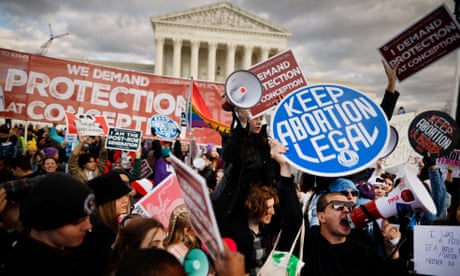- by foxnews
- 08 Apr 2025
‘They created this’: are Republicans willing to lose elections to retain their abortion stance?
‘They created this’: are Republicans willing to lose elections to retain their abortion stance?
- by theguardian
- 22 Apr 2023
- in politics

Democrats have taken multiple actions in response to what they say is a "draconian" and "dangerous" decision by a federal judge in Texas threatening access to the most commonly used method of abortion in the US.
Several Democratic governors have begun to stockpile doses of the drugs used in medication abortions. Nearly every Democrat in Congress signed onto an amicus brief urging an appeals court to stay the decision, while some called on the Biden administration to simply "ignore" the ruling, should it be allowed to stand. A group of House Democrats introduced a bill that would give the Food and Drug Administration (FDA) final approval over drugs used in medication abortion.
Their fury over the ruling has been met with relative silence from Republicans.
Only a handful of congressional Republicans offered immediate comment on judge Matthew Kacsmaryk's decision last week to revoke the FDA's 23-year-old approval of the abortion pill mifepristone. Just a fraction of Republicans on Capitol Hill signed an amicus brief urging an appeals court to uphold the ruling. And among the party's national field of Republican presidential nominees, just one - the former vice-president, Mike Pence - unabashedly praised the decision.
The starkly different reactions underscores just how dramatically the politics of abortion have shifted since last June, when conservatives achieved their once-unimaginable goal of overturning Roe v Wade.
For decades, Republicans relied on abortion to rally their conservative base, calling for the reversal of Roe v Wade and vowing to outlaw the procedure if given the chance. But since the supreme court's ruling in Dobbs v Jackson Women's Health, abortion has emerged as a potent issue for Democrats, galvanizing voters furious over the thicket of state bans and restrictions ushered in by the decision.
Republicans have struggled to respond, lacking a unified policy on abortion in the nearly 10 months since the landmark decision.
"Dobbs really did get Republicans, especially elected Republicans, running scared," said Jon Schweppe, policy director at the conservative American Principles Project.
Polling has consistently found a clear majority of Americans believe abortion should remain legal in all or most cases, though partisan divisions have deepened over the years. A new survey released by the Pew Research Center this week showed that by a margin of more than 2 to 1, Americans believe medication abortion, which is at the center of the current legal battle, should be legal in their state.
A post-Dobbs backlash fueled a string of victories for abortions rights, including in more conservative states, and powered Democratic victories in last year's November midterm elections. And this month, just days before the Texas ruling on mifepristone, abortion rights were a dominant force in a liberal judge's landslide victory in a key race for a Wisconsin supreme court seat.
"It's no surprise that GOP candidates are scared to tie themselves to a decision that is wildly out of step with what voters want," Mini Timmaraju, the president of Naral Pro-Choice American told reporters this week. "They can't be eager to repeat last week's double-digit walloping of extremist judicial candidate, Dan Kelly, in Wisconsin."
In that race, Kelly's opponent, judge Janet Protasiewicz, had effectively promised voters that if she won, flipping the ideological balance of the court from conservative to liberal, the new majority would overturn Wisconsin's 1849 abortion ban.
"People understood the stakes and they were ready to vote for Judge Protasiewicz," said Timmaraju, whose group was active in the contest.
Now, with the 2024 presidential election looming, an increasingly vocal group of Republicans are urging moderation on abortion, warning that the uncompromising positions of their party's culturally conservative base risk alienating crucial swing voters.
"This is an issue that Republicans have been largely on the wrong side of," congresswoman Nancy Mace, a Republican from South Carolina, said in a recent appearance on CNN.
Mace, who considers herself "pro-life", said her party had "not shown compassion towards women" since the fall of Roe. She has urged flexibility, pushing Republicans to expand access to contraception and include exceptions for abortions in cases of rape, incest or when the life of the mother is at risk or the fetus is no longer viable.
Since June, Republican-led legislatures have charged ahead with new restrictions. More than a dozen states ban abortion, with several other Republican-led state legislatures considering new restrictions this session.
On Thursday, the Florida legislature voted to prohibit abortions after six weeks - before many women realize they are pregnant - delivering a major policy victory for the state's Republican governor, Ron DeSantis. Hours later, DeSantis, who is widely expected to run for president in 2024, quietly signed the ban into law with little fanfare, underscoring just how complicated the issue has become for Republicans.
In Nebraska, the state legislature is in the process of debating a six-week ban. But even in the reliably conservative state, some Republican lawmakers are floating an alternative that would expand the window to 12 weeks, a sign that a ban any earlier in pregnancy could stoke public outcry.
One option floated as a politically palatable "compromise" is a proposal by South Carolina senator Lindsey Graham that would implement a federal ban on abortions after 15 weeks of pregnancy.
But the legislation divided Republicans and ultimately only attracted a handful of co-sponsors when he introduced it last year ahead of the midterms. Several Republicans, including the Senate minority leader, Mitch McConnell, argued that limits on abortion should be set by the states.
Asked whether he supported Graham's proposal, Senator Tim Scott, a Republican from South Carolina who this week formed an exploratory committee for a 2024 presidential run, said was "100% pro-life" but declined to answer the question directly. He clarified later that he would back a federal ban at 20 weeks of pregnancy.
Nikki Haley, Donald Trump's former UN ambassador who is running for the nomination, urged Republicans to seek consensus on the issue, asserting that she was "pro-life" but did not "judge anyone who is pro-choice".
"Let's let the states work this out," Haley said, according to the Des Moines Register. "If Congress decides to do it - but don't get in that game of them saying 'how many weeks, how many' - no. Let's first figure out what we agree on."
DeSantis has sought to position himself as a reliable ally of the anti-abortion movement, hoping his support of a six-week ban will appeal to social conservatives searching for an alternative to Trump in the early-voting states Iowa and South Carolina.
Earlier this year, Trump, whose conservative supreme court appointees enabled Roe to be struck down, angered abortion opponents when he warned that abortion is a political liability for Republicans and blamed extremism on the issue for their lackluster performance in the 2022 midterms.
In the escalating legal battle over access to medication abortion, supreme court justice Samuel Alito on Friday temporarily halted a federal appeals court ruling that would have reimposed restrictions on mifepristone. The stay will expire on Wednesday while the court deliberate next steps.
Reproductive rights advocates say the ongoing threat to medication abortion nationwide makes clear that Republicans never actually believed abortion was an issue best handled by the states, as Alito wrote in his 2022 decision overturning the federal right to abortion.
"They are seeking a nationwide ban - but they are not going to stop there," Jennifer Dalven, director of the ACLU Reproductive Freedom Project, told reporters this week. "We are already seeing attacks on birth control."
As a starting point, Schweppe believes social conservatives must be willing to compromise on a federal ban, possibly accepting legislation that falls well short of their long-held goal to end all abortions. He urged Republicans to adopt positions that are broadly popular with wide swaths of voters, including allowances for pregnancies that result from rape or incest, or when the health or life of the mother is at risk.
"We have to be honest about where the fault lines lie," he said. "Exceptions are what drives voter sentiment. That's what Democrats are attacking us on."
Many leading abortion opponents blame recent losses on Republicans' embrace of a so-called "ostrich strategy" - avoiding the topic or trying to change the subject - not their opposition to abortion.
"Republicans have cowered in fear as the consultants and campaign advisors tell them not to talk about abortion," Penny Young Nance, the chief executive and president of evangelical Christian group, Concerned Women for America. In the Wisconsin supreme court race, she said the conservative's defeat was an example of what happens when Republicans are badly outspent and fail to "boldly" defend their position on an issue that has been a defining policy of American conservatism.
"The winning strategy is to tell the truth about the left's extremist position on the issue that is out of [sync] with the views of the American people," Nance said in an email.
As Republicans search for a path forward, Democrats, confident public opinion is on their side, are already preparing to make abortion a central theme of the coming election cycles.
"Even though some in the GOP are trying to stay quiet about the Texas ruling, back home they're still passing and signing abortion bans," Timmaraju said.
"They created this reality," she added. "They cannot run away from it."
- by foxnews
- descember 09, 2016
Ancient settlement reveals remains of 1,800-year-old dog, baffling experts: 'Preserved quite well'
Archaeologists have recently unearthed the remarkably well-preserved remains of a dog from ancient Rome, shedding light on the widespread practice of ritual sacrifice in antiquity.
read more





